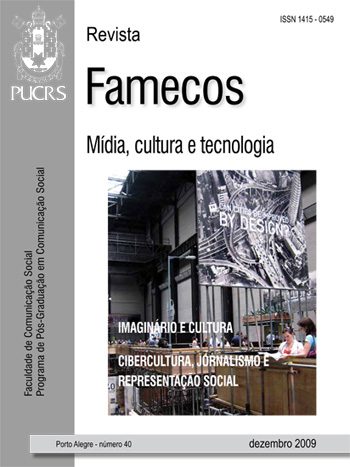La cultura de la movilidad
DOI:
https://doi.org/10.15448/1980-3729.2009.40.6314Palabras clave:
Movilidad, comunicación, ciberculturaResumen
La movilidad es inherente al hombre, estando relacionada con la necesidad de crear un lugar en el mundo, de "construir para habitar" (Heidegger, 1958), de establecer un topus que nos proteja de la soledad y del vacío del espacio genérico y abstracto. La cultura de la movilidad entrelaza cuestiones tecnológicas, sociales, antropológicas. Para la comunicación, la movilidad es central ya que comunicar es hacer mover signos, mensajes, informaciones, siendo todos los medios (dispositivos, ambientes y procesos) estrategias para transportar mensajes afectando nuestra relación con el espacio y el tiempo. En la actual fase de las tecnologías de la movilidad y de localización (los medios locativos), no se trata tanto de aniquilar los lugares, sino de crear espacializaciones. Esta es la tesis aquí defendida. La actual cultura de la movilidad es una cultura locativa.
Descargas
Citas
ADORNO, Theodor. Minima moralia. Paris: Payot, 1980.
ATTALI, Jacques. L’Homme nomade. Paris: Fayard, 2003.
BHABHA, Homi K. The location of culture. Londres: Routledge, 1994.
BAUMAN, Zygmunt. Modernidade líquida. RJ: Zahar, 2001.
CAIAFA, Janice. A aventura das cidades. Ensaios e etnografias. Rio de Janeiro: FGV, 2007.
CARON, André e CARONIA, Letizia. Culture mobile. Montreal: Presses de l’Université de Montreal, 2005.
CASTELLS, Manuel, et al. Mobile communications and society. A Global Perspective. Cambridge: MIT Press, 2007.
DOURSIH, Paul; et alli. Culture mobilities. Diversity and Agency in Urban Computing. USA, 2007.
DELEUZE, Gilles; GUATTARI, Félix. Mille plateaux. Capitalisme et Schizophrénie. Paris: Les Editions de Minuit, 1980.
FOUCAULT, Michel. De outros espaços. In: Architecture, Mouvement, Continuité, 1984. Disponível em: http://www.rizoma.net/interna.php?id=169&secao=anarquitextura Acesso em: 11. dez. 2008.
AYDEN, Florian; TEMEL, Robert. Temporary Urban Spaces. Basel: Birkhäuser, 2006.
HEIDEGGER, Martin. Bâtir habiter penser. In: Essays et Conférences, Paris: Gallimard, 1958.
KATZ, James. & Aakhus, Mark. Perpetual Contact: Mobile Communication, Private Talk, Public Performance. Cambridge: University Press, 2002.
KATZ, James. E (Ed). Handbook of mobile communication studies. Massachusetts: MIT, 2008.
KELLERMAN, Aharon. Personal Mobilities. Nova Iorque: Routledge, 2006.
KOSKINEN, Ilpo. Seeing with Mobile Images. Toward Perpetual Visual Contact. In: The Global and the Local in Mobile Communication: Places, jun. 2004.
KWAN, Mei-Po. Mobile communication, Social Networks, and Urban Travel: Hypertext as a New Metaphor for Conceptualizing Spatial Interaction. In: The Professional Geographer, v. 59, n. 4, nov. 2007.. Washington, p. 434-446.
LATOUR, Bruno. Reassembling the social. An Introduction to Actor-Network-Theory. Oxford, 2005.
LEFEBVRE. Henri. The Production of space. Blackwell Publishing, 1991.
LEMOS, André. Locative media in Brazil. In: Wi. Journal of Mobile Media. Montreal/Toronto: Summer, 2009.
LEMOS, André. Mobile Communication and New Sense of Places: a critique of spatialization in cyberculture. In Galáxia, n. 18, dez. 2008, PUC-SP, p. 91-108.
LING, Rich. The mobile connection. The cell phones impact on society. San Franscisco, 2004.
MAFFESOLI, Michel. Du nomadism. Vagabondages Initiatiques. Paris: Librarie Générale Française, 1997.
MASSEY, Doreen. A Global sense of place. In: Readings Human Geography, Trevor Barnes and Derek Gregory. (Eds) London: Arnold, 1997, p. 315-323.
MEAD, George. Mind, self, and society: from the standpoint of a social behaviorist. Chicago: University of Chicago Press, 1967.
MEYROWITZ, Joshua. No sense of place. The impact of electronic media on social behavior. London: Oxford University Press, 1985.
MUMFORD, Lewis. A Cidade na História. Suas origens, transformações e perspectivas. São Paulo: Martins Fontes, 1988.
NYÍRI, Kristóf. A sense of place. The global and the local in mobile communication. Viena: Passagen Verlag, 2005.
SERRES, Michel. Les messages à distance. Montréal: Editions Fides, 1995.
SHIELDS, Rob. Places on the margin. Alternative geographies of modernity. London: Routledge, 1991.
SHIRVANEE, Lily. Locative viscosity: Traces of social histories In: Public Space, 20016. Disponível em: http://leoalmanac.org/journal/vol_14/lea_v14_n03-04/lshirvanee.asp Acesso em: 13 dez. 2008.
SIMMEL, Georg. La tragédie de la culture. Paris: Rivage poche, 1988.
SOROKIN, Pitirim. Social and cultural mobility. London: Collier -Macmilliam Limited, 1964.
THRIFT, Nagel. Steps to an Ecology of Place. In Human Geography Today, Doreen Massey, John Allen and Philip Sarre (Eds) Cambridge: Polity Press, 1999, p. 295-322.
TUAN, Yi-Fu. Space and place. The Perspective of Experience. Minneapolis/London: University of Minnesota Press, 2003.
URRY, John, et al. Mobilities, immobilities and moorings. In: Mobilities, 1, Londres: Routledge, 2006.
URRY, John & Sheller, Mimi. Mobile technologies and the city. Londres: Routledge, 2006.
URRY, John. Sociology Beyond Societies. Mobilities for the twenty-first century. London: Routlegde, 2000.
Descargas
Cómo citar
Número
Sección
Licencia
Derechos de Autor
La sumisión de originales para la Revista Famecos implica la transferencia, por los autores, de los derechos de publicación. El copyright de los artículos de esta revista es el autor, junto con los derechos de la revista a la primera publicación. Los autores sólo podrán utilizar los mismos resultados en otras publicaciones indicando claramente a Revista Famecos como el medio de la publicación original.
Creative Commons License
Excepto donde especificado de modo diferente, se aplican a la materia publicada en este periódico los términos de una licencia Creative Commons Atribución 4.0 Internacional, que permite el uso irrestricto, la distribución y la reproducción en cualquier medio siempre y cuando la publicación original sea correctamente citada.






